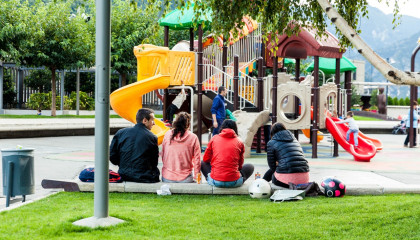You are here: Providing childcare for children with special educational needs and disabilities
Finding the right childcare can be a real struggle for parents, but for those who have children with special educational needs and disabilities (SEND) the task can be even more difficult. But childcare providers can help and it doesn't have to mean that you need to make huge changes to the care you already offer.
With funding from the Department for Education, we have developed a series of resources to support childcare providers who want to make their settings more inclusive and provide care for children with special educational needs and disabilities.
A guide to inclusive childcare for childcare providers
Childcare for children with special educational needs and disabilities (SEND) is crucial to all families who need it. It gives children a chance to play with other children and adults, to explore the world around them, to prepare for school, or just chill-out after school or in the holidays. Childcare also gives parents the opportunity to work, train, get stuff done at home or spend time with other children.
Read our guide for childcare providers, which gives information about how you can make your childcare setting inclusive and accessible for children with SEND. This guide was written by Unique Kidz and commissioned by Coram Family and Childcare.
Checklist for delivering information as part of the Local Offer
As part of our Childcare for all: the role of the Local Offer research report, Coram Family and Childcare developed a good practice checklist for local authorities on delivering information about childcare for children with special educational needs and disabilities as part of the Local Offer.
Childcare guides for parents by Coram Family and Childcare
We have developed a number of guides that you can share with parents to help them find, choose and fund childcare.
Useful resources for childcare providers
Parents of disabled children often struggle to find information and therefore miss out on the services and help they are entitled to. Professionals can make a big difference, by helping families find out about what is available locally and support them to access it.
The Communication Trust
A coalition of over 50 not-for-profit organisations working together to support parents and professionals with children and young people’s speech, language and communication. They have created a range of resources to support professionals, including information about children's communication development and how to identify and support children with speech, language and communication needs. www.thecommunicationtrust.org.uk
Contact
Contact is the charity for families with disabled children. Contact supports families with the best possible guidance and information. They bring families together to support each other. And help families to campaign, volunteer and fundraise to improve life for themselves and others. www.contact.org.uk
Kids
Their eLearning suite was developed for people working with disabled children and young people to understand how to respond appropriately to each child’s individual needs. It covers a range of different requirements − from those who need a simple introduction and overview, through to those working with disabled children and young people on a daily basis. www.kids.org.uk
Mencap
Supports people with a learning disability to live life as they choose. They have a dedicated space for professionals on their website that outlines the key issues and provides some good practice information about how to support the inclusion of children with a learning disability in your services. www.mencap.org.uk
National Autistic Society
Provides information, support and pioneering services for people with autism and their families. They provide a number of resources for professionals including a range of resources for teachers and schools; and an online platform for professionals to support children and young people with an autism spectrum disorder to avoid exclusions. www.autism.org.uk
National Deaf Children's Society
Provides a wide range of resources to support professionals who work with deaf children. www.ndcs.org.uk
Scope
Produces a number of resources to help you include disabled children in early years settings, from games all children can play to practical tips such as mealtime tips. www.scope.org.uk
Sense
Provides information and advice for teaching professionals along with general advice on working with children. Also offer training and consultancy. www.sense.org.uk
Sign up to our newsletter
Get the latest news, research and resources from Coram Family and Childcare.





